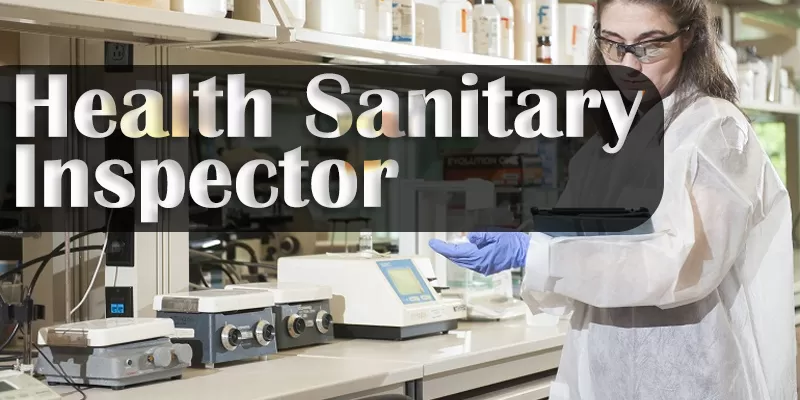
ITI Trade: Health Sanitary Inspector
Powered by NCVT
The Health Sanitary Inspector trade under the Craftsmen Training Scheme (CTS) is a job-oriented course designed to create skilled professionals for the healthcare sector, government bodies, and private industries. The program is recognized by National Council for Vocational Training (NCVT) and meets the current industrial requirements of both Indian and International markets.
🔹 Why Choose Health Sanitary Inspector?
- Government & Private Sector Jobs
- Entrepreneurial and Self-employment Opportunities
- High Demand in Healthcare, Sanitation, and Public Health Sectors
- Fulfills Industrial Requirements Nationally & Internationally
This trade is empowering, providing trainees with skills and knowledge that open doors to sustainable employment and self-reliance.
🔹 Job Opportunities After Completion
After successfully completing this one-year course, candidates can find employment in various sectors including public health departments, municipal bodies, hospitals, NGOs, and private healthcare organizations.
👉 Job Roles Include:
- Sanitary Inspector
- Health Assistant
- Disinfecting Inspector
- Food Inspector
- Slaughter House Inspector
- Mosquito Inspector
- Public Health Worker
- Environment Health and Safety Assistant
🔹 Employment Sectors
✔️ Healthcare Sector
✔️ Government Departments & Municipalities
✔️ NGOs working in Public Health & Sanitation
✔️ Environmental & Waste Management Organizations
✔️ Contractual Employment in Private Sector
✔️ Self-Employment as a Consultant or Sanitation Entrepreneur
🔹 Further Opportunities
✅ Eligible candidates can join the Apprenticeship Programme under the Health Sanitary Inspector trade.
✅ After successful completion of the apprenticeship, candidates receive a National Apprenticeship Certificate (NAC).
✅ NAC holders are preferred for skilled worker roles in healthcare and public health departments.
🔹 Key Takeaways of the Course
- Duration: 1 Year
- Certification: National Trade Certificate (NTC) by DGT / NCVT
- Skills Covered:
- Environmental Hygiene
- Waste Disposal Management
- Disinfection & Sterilization Techniques
- Water Quality Testing
- Food Safety & Inspection
- Control of Vector-Borne Diseases (e.g., mosquitoes)
- Public Health Education
- Sanitation and Health Laws & Regulations
🌟 Empowering Health & Hygiene in Communities!
The ITI Health Sanitary Inspector trade is a gateway to becoming a key contributor to community health and hygiene, ensuring safe living environments, and promoting public health awareness.
Trade Summary: Health Sanitary Inspector
Duration: 1 Year
Certification: National Trade Certificate (NTC) by NCVT
📚 Semester I - Core Competencies
- Nutrition & Diet Planning
➤ Make a nutritional plan for all age groups under given conditions.
➤ Design a balanced diet as per the specific requirements. - Disease Identification & Assessment
➤ Identify diseases caused by various nutritional deficiencies.
➤ Assess symptoms and recommend preventive measures. - Food Safety & Preservation
➤ Inspect and report cases of food adulteration.
➤ Suggest and apply food preservation techniques for different food types. - Water Quality & Pollution Control
➤ Understand water properties and causes of pollution.
➤ Summarize water supply systems, including city/country water treatment processes.
➤ Assemble plumbing systems for water conservation. - Water Purification & Sanitation
➤ Identify and explain water purification processes.
➤ Handle night soil management to protect the environment and human health. - Solid Waste Management
➤ Plan a solid waste management system for an area or small town. - Air & Noise Pollution Control
➤ Identify air pollution sources and recommend remedial measures.
➤ Understand global warming, its effects, and apply remedial actions.
➤ Suggest ways to minimize noise pollution and plan ventilation for specific areas. - Liquid Waste Management & Sewerage Systems
➤ Understand the concept of liquid waste disposal and its health hazards.
➤ Plan and assist in constructing and maintaining sewers, traps, and plumbing tools. - Disposal of Dead Animals & Soil Management
➤ Recommend proper disposal methods for dead animals and humans.
➤ Identify soil types and their public health importance, including land reclamation. - Sanitary Measures for Housing & Public Gatherings
➤ Plan sanitary prescriptions and medical measures for housing, fairs, and festivals. - Occupational Health & Safety
➤ Identify occupational health hazards and follow safety regulations.
➤ Take measures to prevent occupational diseases. - Environmental Control & Spraying Equipment
➤ Prepare and manage biological environments.
➤ Operate and maintain different types of spraying equipment.
📚 Semester II - Core Competencies
- Health Education & Awareness
➤ Develop and implement health awareness programs for the community. - Personal Hygiene & Social Impact
➤ Emphasize the importance of personal hygiene and its societal impact. - First Aid & Medical Emergencies
➤ Perform first aid treatments during medical emergencies. - Disease Control & Disinfection
➤ Assess diseases, provide timely first aid, and carry out sterilization.
➤ Understand disinfection techniques and their importance in disease control. - Immunization & Preventive Health
➤ Follow immunization schedules and educate about their significance. - Health & Hygiene Fundamentals
➤ Reinforce basic hygiene practices for personal health and well-being. - Demographic Analysis & Health Survey
➤ Understand and analyze demographic factors such as birth rate, death rate, morbidity, MMR, IMR, etc.
➤ Conduct and categorize health surveys and understand census data collection. - Legal Awareness & Terminology
➤ Familiarize with vocabulary and terminology of different health-related acts and legislations.
🌟 Generic Learning Outcomes
- Safety & Housekeeping Practices
➤ Recognize and comply with safe working practices and environmental regulations.
➤ Maintain cleanliness and hygiene in work areas, kitchens, equipment, and utensils. - Emergency Response & First Aid
➤ Assist in emergencies and perform basic first aid procedures. - Soft Skills & Communication
➤ Understand and practice soft skills and technical English for effective communication. - Environmental Awareness & Resource Conservation
➤ Promote energy conservation and take steps to mitigate global warming and pollution.
➤ Optimize the use of available resources in daily tasks. - Financial Literacy & Entrepreneurship
➤ Understand personal finance, entrepreneurship, and effectively manage tasks for personal and societal growth.
✅ Conclusion:
The Health Sanitary Inspector trade equips trainees with critical skills in public health, sanitation, disease control, and environmental management, making them valuable professionals in the healthcare and sanitation sectors.
